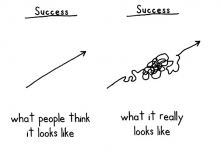
A version of this article was originally published on LinkedIn by Stephanie Licata, M.A. A.C.C.
I just read my zillionth article on how bosses are supposed to be coaches, right now, today and immediately!
To say I am frustrated is an understatement. As a practiced coach for the past 12 years, I can tell you that no one becomes a coach overnight. The internet is plagued with super vague platitudes that tell you what SHOULD happen in companies, but very rarely give you more than a few fluffy bullets about how, and certainly rarely mention HOW MUCH it is going to actually cost companies.
Your self-motivated leader who is over-committed to their own development could possibly seek out developing themselves as a coach on their own. This is a huge commitment of time, money, and effort. With a full time job, it’s unlikely that a manager, director or senior leader is sitting around with gobs of time to train themselves as a coach.
The worst thing about these demands that bosses be coaches is the utter misunderstanding of what coaching is and what it takes to truly master coaching. I’m 12 years in and I would say I’m about 40% there.
Not investing in leadership development for leaders is the silent killer of every organization. According to Gallup, Managers who are not engaged or who are actively disengaged cost the U.S. economy $319 billion to $398 billion annually.
If you want employees to produce more, engage more, sell more, serve more, you have to invest in the front end of that. When you take a salesperson and ask them about their relationship with the dealership, they will almost always define that by the relationship they have the with GSM or GM. Leaders ARE the organization to employees. This is your employer brand, and its critical that it be as tight as the customer experience.
Back to coaching…
Coaching is an art and a science. It requires a distinct way of being and constituting oneself as a champion for people’s potential all (or at least most) of the time. It is a set of skills that are only learned through an incredible amount of repetition in live coaching conversations with other humans and teams.
Telling all bosses to be coaches is like telling all doctors to be surgeons.
There is no way to be the latter without intense training and development and PRACTICE. Even the medical field provides medical simulation for surgeons to hone their extremely precise skills. After all, you are dealing with people’s lives. Thought not in the same way, as a coach you are actually impacting a human being in ways that sometimes last forever.
So how do leaders go from boss to coach? They can’t do this from just reading a Forbes article. They can’t learn coaching from taking a multi-day course. Let’s explore how to do it and how NOT to do it.
The art of learning coaching is explicit: to learn coaching you must learn and practice skills over and over again and be guided and evaluated along the way while being trained by a coaching professional. What does this look like? What does this mean? How do we do this?
Unless senior leaders and HR professionals provide intense and INTERNAL coach development for their leaders, branded to their organization and industry, they will just be readers of blogs with a few “aha” moments. Leaders will never be coaches by watching a really bad self-paced video training that companies literally light money on fire with to purchase.
This type of leadership development effort includes elongated training that requires consistent live practice through coaching with team members.
There is absolutely no way to turn a boss into a coach by participating in a 3-day training (another almost total waste for companies).
Why not train your leaders in coaching and have them coaching their teams as they learn? The best part about investing in internal coach training initiatives is that you actually give back to your employees while you do it. You win with managers and you win with their teams.
There is really no other way around this. If you say, “My leaders don’t have time to dedicate a few hours a month to this!,” that translates to, “We don’t have time to do one of the most impactful things that helps our managers be more productive and manage their teams better to accomplish our mission. It is what it is.”
Put down your blog and do something. Find out what budget you have available. Understand who the leaders are that need the most coach skill training. Organize a meeting and start discussing this. Think about what it would be like if all of your leaders were coaching and development employees, retaining talent, increasing performance and productivity and more. Is it worth it? No one should really have to think about that.
There is as much research out there about how to engage employees as there is about the food you shouldn’t eat and cigarettes you shouldn’t smoke. Yet year after year, too many senior leaders light up an unfiltered Marlboro and eat a slice of cake made with lard, unwilling to invest their biggest asset: their people.
Until we learn this lesson, we have little right to expect anything from anyone. If you think people are just supposed to come to work, get treated poorly by their manager and just put their heads down and do their job, 1955 called and wants their management principles back.
To put my money where my mouth is, literally, internal coach skill training is at minimum a 6-month process. It will require 5-6 hours a month from each participant. It can be done part live, part live/virtual and to put up to 30 managers through it it is going to cost in the range of $50-75k. Before you balk, that is actually less than the cost of sending one of these people to a multi day course plus travel and meals, and with little to no impact directly on their teams. (Do the math, I promise!)
Help your bosses be coaches. Do it with integrity. Do it with money and time. Because that is what we are here to do: to help people and organizations be better.
Stephanie Licata is the Principal and Co-Founder of DCG Consulting. DCG Consulting works with dealers to employ strategies that increase team effectiveness, productivity and profitability.
To schedule a complimentary consultation with Ms. Licata click here.












